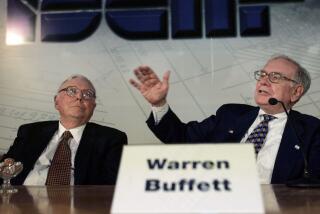The Organization Man--Big Changes Since the ‘50s
PARK FOREST, Ill. — “The Organization Man,” in William Whyte’s scathing 1956 study of the same name, was a rigid conformist who put the corporation ahead of himself.
Today’s executive is more cynical about what America can do, more self-expressive and less willing to sacrifice his personal life for the good of the corporation. He may even quit the big company and start a new business using his experience or quit work altogether for a year of travel.
That is the conclusion of management consultant Paul Leinberger, who says the baby boom generation has translated the American work ethic into an “enterprise ethic.”
Leinberger, whose father was one of the original organization men interviewed by Whyte more than 30 years ago, has returned to this suburban Chicago community that was the focus of “The Organization Man.”
He tracked down dozens of Whyte’s original subjects to find out how their lives developed. He also interviewed their sons and daughters and determined how and why their values differ from those of their parents.
In all, he talked to some 400 people. The results will be published next year by Harper & Row in a book entitled “The Organization Man Revisited: A New Vision of Corporate America.”
The organization man, Whyte wrote, was a “middle-class American who has left home, physically as well as spiritually, to take the vows of organization life. He not only works for the organization; he belongs to it.”
Not Want to Repeat
In exchange for a lifetime of financial security and a “soothing” sense of belonging, Whyte charged, these men were giving themselves to a system that “inhibits individual initiative and imagination and the courage to exercise it against group opinion.”
This group was indeed successful, running the engines of post-war American industrial growth, becoming mayors of its towns, school board trustees and electing its church ministers.
But the organization man paid a price, one that his sons and daughters do not want to repeat.
“Having grown up in the 1950s and 1960s, their view of organizations is different,” Leinberger told Reuters in an interview.
“They saw how their fathers had been betrayed, how they had worked 60-70 hours a week, or had been moved across the country every few years without ever questioning it, only to be fired because of a corporate buyout, oil shock or restructuring.”
The case of Ray Myers and his family typifies the changes from father to sons.
Myers, a former executive with Continental Illinois National Bank and Trust Co. of Chicago, was one of Whyte’s subjects. The Park Forest resident had worked his way up the corporate ladder, giving generously of his time for years.
But in 1982, turmoil struck Continental, the Midwest’s biggest bank at the time, because of dubious oil-related loans to Penn Square Bank in Oklahoma. Continental ultimately had to be rescued with a $4.5-billion federal bailout.
The problems at the bank took a heavy emotional toll on Myers, who soon retired.
“Continental Bank, to me, was one of the great organizations,” he told Leinberger. “We thought we were the cream of the crop, and then to have it all suddenly disintegrate . . . “
Children Different
His children have rejected the father’s path to personal success. But they have not chucked the deeply rooted American work ethic, committing themselves instead to what they do for a living, not where they do it.
“My dad hoped I would get an MBA and become a corporate giant,” son Randy Myers, 38, a carpenter in Nederlander, Colo., told Leinberger. “But I don’t think corporate giantism is in my horoscope. My dad was completely focused on his career. . . . For me, the most important thing is not my work, but my life. It makes no sense to live for your work.”
Scott Myers, 33, a computer engineer, told Leinberger: “I don’t have any loyalty to the company. I’m in it for me. . . . I see a company as a vehicle.”
Leinberger, who has a doctorate in organizational psychology, said this greater stress on individual enterprise stemmed from growing up in America’s child-centered society of the 1950s and 1960s. That culture, ironically, was possible because of the organization man’s job security.
As a result, baby boomers were like a collective lonely child, Leinberger said.
“We thought--those of us who were involved in the radicalism of the 1960s--that we could change the world because everything up to that point had been focused on us. So we figured we’d just do it again, only in a bigger way.”
The optimism even appears to survive stock market crashes. After Black Monday, Leinberger contacted many of his interviewees.
“The younger people still have this feeling that while the world may be going to hell in a hand basket, it isn’t going to happen to them,” he said.
More to Read
Inside the business of entertainment
The Wide Shot brings you news, analysis and insights on everything from streaming wars to production — and what it all means for the future.
You may occasionally receive promotional content from the Los Angeles Times.










